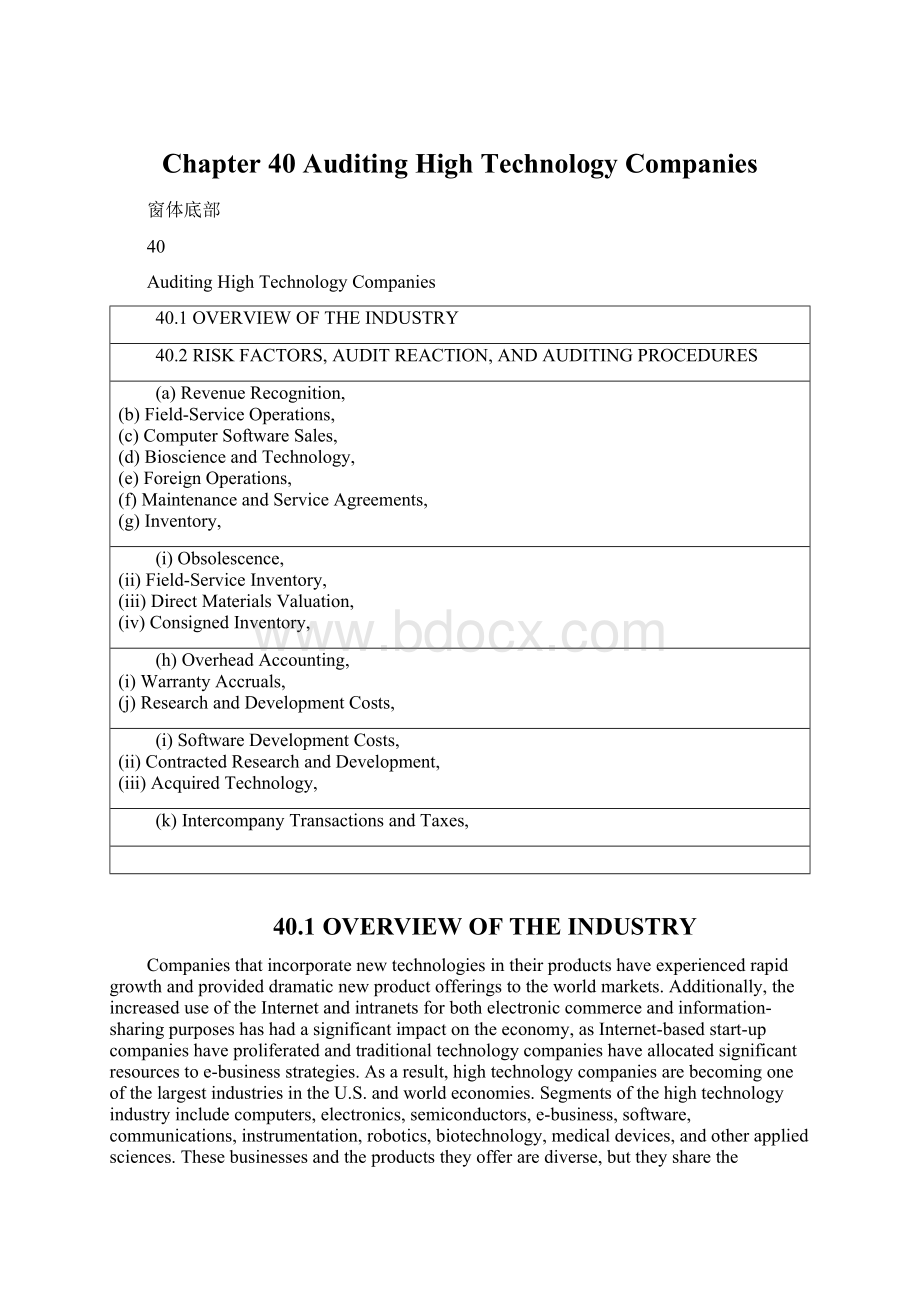Chapter 40 Auditing High Technology Companies.docx
《Chapter 40 Auditing High Technology Companies.docx》由会员分享,可在线阅读,更多相关《Chapter 40 Auditing High Technology Companies.docx(10页珍藏版)》请在冰豆网上搜索。

Chapter40AuditingHighTechnologyCompanies
窗体底部
40
AuditingHighTechnologyCompanies
40.1OVERVIEWOFTHEINDUSTRY
40.2RISKFACTORS,AUDITREACTION,ANDAUDITINGPROCEDURES
(a)RevenueRecognition,
(b)Field-ServiceOperations,
(c)ComputerSoftwareSales,
(d)BioscienceandTechnology,
(e)ForeignOperations,
(f)MaintenanceandServiceAgreements,
(g)Inventory,
(i)Obsolescence,
(ii)Field-ServiceInventory,
(iii)DirectMaterialsValuation,
(iv)ConsignedInventory,
(h)OverheadAccounting,
(i)WarrantyAccruals,
(j)ResearchandDevelopmentCosts,
(i)SoftwareDevelopmentCosts,
(ii)ContractedResearchandDevelopment,
(iii)AcquiredTechnology,
(k)IntercompanyTransactionsandTaxes,
40.1OVERVIEWOFTHEINDUSTRY
Companiesthatincorporatenewtechnologiesintheirproductshaveexperiencedrapidgrowthandprovideddramaticnewproductofferingstotheworldmarkets.Additionally,theincreaseduseoftheInternetandintranetsforbothelectroniccommerceandinformation-sharingpurposeshashadasignificantimpactontheeconomy,asInternet-basedstart-upcompanieshaveproliferatedandtraditionaltechnologycompanieshaveallocatedsignificantresourcestoe-businessstrategies.Asaresult,hightechnologycompaniesarebecomingoneofthelargestindustriesintheU.S.andworldeconomies.Segmentsofthehightechnologyindustryincludecomputers,electronics,semiconductors,e-business,software,communications,instrumentation,robotics,biotechnology,medicaldevices,andotherappliedsciences.Thesebusinessesandtheproductstheyofferarediverse,buttheysharethefollowingcommoncharacteristicsthatresultintheirinclusioninthehightechnologycategory:
∙Intensiveresearchanddevelopment,whichgenerallycauseoperatinglossespriortoproductintroduction
∙Aneedtoidentifyfundingtosustainthecompanypriortoproductintroduction,andthereafterformarketingandsaleseffortsandworkingcapital
∙Productsthatderivevaluefromtechnologyasopposedtotheproductionprocess
∙Significantcompetitiveadvantageandrapidgrowthofcompaniesthatarefirstorsecondtomarket
∙Suddenemergenceofrapid-growthnichemarkets
∙Rapidgrowthintotalmarketandindividualcompanysize
∙Extensiveuseofresellersandthird-partychannelsasameansofincreasingdistributionvolumeandminimizingsellingandadministrativecosts
∙Rapidentryintointernationalmarkets
∙Highgrossmarginsthatshrinkrapidlyascompetingproductsareintroduced
∙Extensivewarrantyandcustomersupportcommitmentsthatresultinhighcustomerservicecosts
∙Rapidproductobsolescencecausedbytheintroductionofcompetingproductsutilizingmoreadvancedtechnologies
∙Frequentinstancesofproductsthatfailtomeetcustomerexpectationsorhaveshortlifecycles,resultinginrapiddownturnsforindividualcompaniesorentirenichemarkets
∙SignificantoperationsutilizingtheInternet/electroniccommercebusinessmodel
Inadditiontoprovidingthedefiningcharacteristicsofhightechnologycompanies,theseattributesareoftenthecauseofthemostsignificantauditissuesintheindustry.Suchissuesincludeprematurerevenuerecognition;impropercapitalizationofresearchanddevelopmentcosts;unexpectedinventorywrite-offs;andfailuretoappropriatelyaccountforsalesdiscounts,returnprovisions,andvendorcommitments.Furthermore,therapidgrowthexperiencedbymanyhightechnologycompaniesfrequentlyresultsincompaniesoutgrowingtheiraccountingsystemsandcontrols.
Thesefactorsandthefrequencyofbusinessfailuresinthehightechnologyindustrymakeitnecessaryfortheauditortoexerciseincreaseddiligenceinassessingrisk-includingtheriskthatthecompanywillbeunabletoobtainsufficientfundingtocontinueasagoingconcern-anddeterminingtheauditstrategyandinperformingsubstantivetests.Thischapterdiscussesuniqueaspectsofthehightechnologyenvironmentandtherelatedauditimplications.
40.2RISKFACTORS,AUDITREACTION,ANDAUDITINGPROCEDURES
Revenuerecognitionisakeyauditriskareainthehightechnologyindustry,largelybecauseoftheSecuritiesandExchangeCommission's(SEC)focusonit.Specifically,theSEChasrequestedthattheFinancialAccountingStandardsBoard(FASB)consideraddingseveral"Internet/dot-com"issuestotheagendaoftheEmergingIssuesTaskForce(EITF).Inaddition,inDecember1999theSECstaffissuedStaffAccountingBulletin(SAB)No.101,RevenueRecognitioninFinancialStatements,whichinessenceextendedthefourcriteriaforrevenuerecognitionunderStatementofPosition(SOP)97-2,SoftwareRevenueRecognition(discussedinthemainvolume),toallcompanies.TheSABcallsforstricterinterpretationsofcertaincharacteristicsofsalestransactions,suchasinstallation,customeracceptance,andupfrontfees,areasthathaveaparticularimpactonhightechnologycompanies.
Thecommoncharacteristicsofhightechnologycompaniescitedpreviouslycanincreasedramaticallytheinherentriskstowhichsuchcompaniesarevulnerable,aswellascontrolrisk.Auditareascommonlyaffectedbytheseincreasedrisksincluderevenuerecognition,inventory,field-serviceoperations,warrantyaccruals,andresearchanddevelopmentcosts.Theremainderofthischapterdiscusseshowtheauditorshouldidentifyandaddresssuchrisks.
(a)RevenueRecognition
Technologydevelopedbyavendoroftencanbeappliedtoalargenumberofdifferenttypesofproductatminimalincrementalcost.Therefore,itisnotuncommonforsalesandmanagementpersonneltostructurelargenumbersoftransactionssothateachisuniqueinsomemanner.Especiallyclosetotheendofanaccountingperiod,vendorscommonlyofferlargesalesdiscountsandotherconcessions,suchasproductwarranties,rightsofreturnorexchange,acceptanceclauses,orfreeservices.Theseuniquecontractualarrangementsmakethedeterminationofrevenuerecognitionmoredifficultthaninmanyotherindustries.
Severalhightechnologycompanieshaveexperiencedbusinessfailuresasaresultofinadequatecontrols,includingmonitoringcontrols.Insomeofthoseinstances,employeestookadvantageofthecompany'sineffectiveinternalcontroltorecordrevenuethatshouldhavebeendeferredaccordingtotheprovisionsoftherelatedsalescontracts.Suchprovisionsmaygrantrightsofreturn,exchange,oracceptance;extendedpaymentterms;andtherighttoreceiveadditionalproductsorservicesinthefuture;ormayspecifyothervendorobligations.Inassessingthecompany'sinternalcontrol,theauditorshoulddeterminethatmanagementhasestablishedandmaintainssufficientcontrolstoidentifyandproperlyaccountforsuchuniquesalesarrangements.Thiscommonlynecessitatesareviewofallmaterialnonstandardsalescontractsbyappropriatepersonnel.Controlsalsoareneededtoensurethataccountingpersonnelarenotifiedofcommitmentsmadebysalespersonnelthatarenotincludedinsalescontracts.
Theauditorshouldreadsignificantsalescontractsandexaminetherelevantfactsandcircumstancessurroundingindividualtransactionsinordertodeterminewhetherrevenuehasbeenrecognizedappropriately.Frequently,acompanywillnothavedetailedcustomerdocumentationsettingforththetermsofaparticularsale.Inthesecircumstances,theauditorshouldgiveseriousconsiderationtocontactingcustomersdirectlythroughdetailedconfirmationsthatincludethespecifictermsofsaleasrepresentedbythecompany.
Theauditorshouldnotconsiderrevenuerecognitioninisolationfromthecollectibilityoftherelatedaccountsreceivable.Inmanycases,theabilityofthevendortocollectreceivablesistheultimatedeterminantofwhenrevenueshouldberecognized.Significantreceivablebalancesthatremainuncollectedlongafterthebalancesheetdateordayssalesoutstandingthatareunusuallyhighmaycallintoquestiontheappropriatenessoftheentity'srevenuerecognitionpolicies.
(b)Field-ServiceOperations
Manyhightechnologymanufacturershavefield-serviceoperationsthatsupportequipmentthathasbeendeliveredandinstalled.Revenuesfromfield-serviceoperationsmaybebasedoncontractsorindividualservicecalls,dependingontheunderlyingserviceormaintenanceagreementwiththecustomer.Theauditorshouldbealerttoserviceandmaintenancecoststhatshouldnotbebilledtocustomersbecausethecustomerisentitledtotheservicesunderwarrantyagreements.
Field-serviceoperationstendtobegeographicallydispersedandcharacterizedbyalargevolumeoflow-dollar-valuetransactions.Thegeographicaldispersionoftenrequireslargeamountsoftestequipmentandpartsinventoryatmanylocations.Controllingtheseoperationsrequireseffectiveproceduresandmanagementsystems,whichmaynotbefullydeveloped.Internalauditparticipationinthisareaisoftencriticalinattainingadequateauditcoverage.
(c)ComputerSoftwareSales
AICPAStatementofPosition(SOP)97-2,SoftwareRevenueRecognition,addressessoftwarerevenuerecognitionprinciples.SOP97-2supersededSOP91-1,whichwasappliedbyanalogytorevenuerecognitionforhightechnologyproductsotherthansoftware.ItisexpectedthatSOP97-2alsowillbeappliedtononsoftwaresales.Ingeneral,SOP97-2requiresthatrevenuenotberecognizeduntiltheproductisdelivered;however,theSOPalsostatesthatrevenuemaynotberecognizedevenwhendeliveryhasoccurred,unlessallofthefollowingconditionshavebeenmet:
∙Evidenceofanagreementhasbeenobtained
∙Collectibilityoftherelatedreceivableisprobable
∙Thevendor